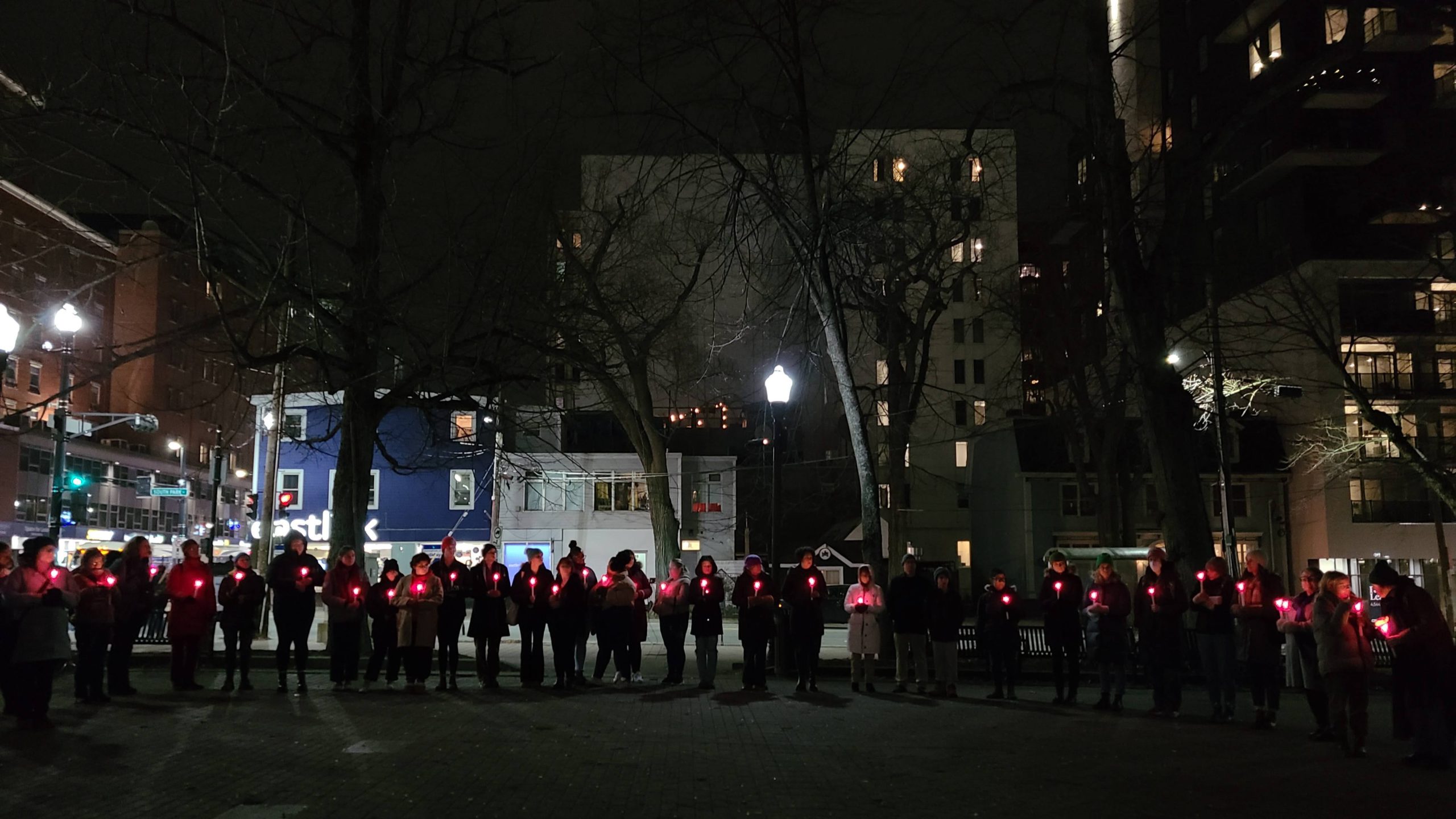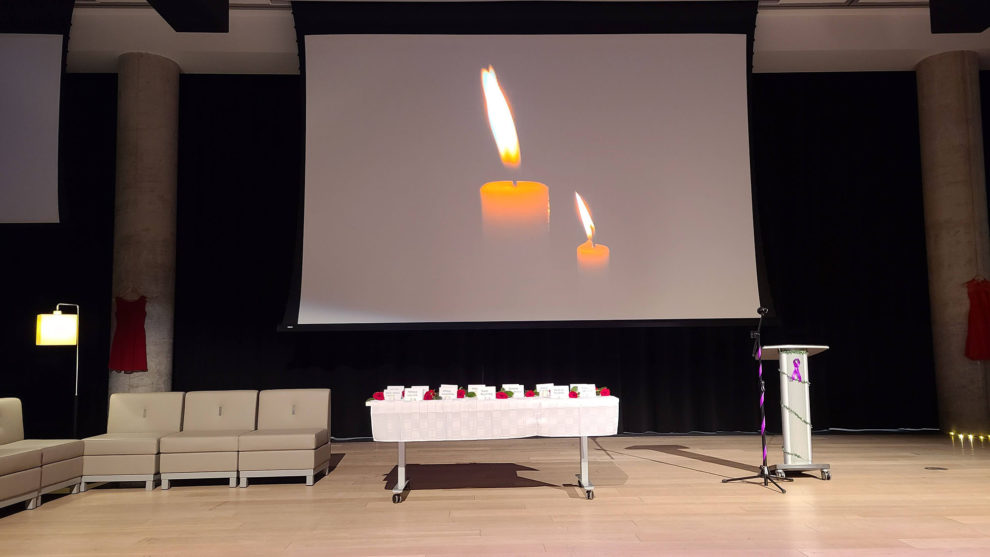Reports must lead to action on gender-based violence, advocates say
Calls-to-action come on anniversary of the Montréal Massacre

caption
Attendees at this year’s vigil for the National Day of Remembrance and Action to End Gender-based Violence formed a circle to hear opening remarks and a prayer from elder Marlene Companion.Editor's Note
Content Warning: This story contains discussions about gender-based violence and the Mass Casualty Commission. If you are experiencing gender-based violence or need support, call or text the Bryony House Distress Line at 902-422-7650. For emergencies, dial 911 or the Mental Health Mobile Crisis Unit at 1-888-429-8167.
“We need to see true changes,” said trauma therapist Kristina Fifield as she spoke beside a display memorializing the 14 women killed during the Montréal Massacre. Fifield is the provincial community coordinator working for the Avalon Sexual Assault Centre and has 13 years of experience in the gender-based violence sector.
She says it is not enough to continue writing reports and conducting inquiries which do not result in action combatting gender-based violence in Nova Scotia. “The families of the individuals that were impacted in Portapique deserve better. Our communities deserve better,” Fifield said.
Feminist advocates and people like Fifield who work with survivors of gender-based violence spoke at a vigil on the evening of Dec. 6 in Halifax to commemorate the National Day of Remembrance and Action to End Gender-based Violence.
About 100 people gathered in Victoria Park to observe the day, which marks the 33rd anniversary of the École Polytechnique Massacre, in which a man gunned down 14 women.
Gender-based violence and the Mass Casualty Commission
During the vigil, Fifield asked Nova Scotians to pay attention to the Mass Casualty Commission, which must submit its final report with recommendations regarding the April 2020 mass casualty event in Portapique, N.S., by March 31, 2023.
She says details about the perpetrator revealed during the commission’s work show how Canada’s largest mass casualty event constitutes gender-based violence.
“The perpetrator had a long history of perpetrating violence towards vulnerable, marginalized, folks,” Fifield said during an interview before the vigil. “There was a long history with (his partner) Lisa Banfield experiencing intimate partner violence.”
A report submitted to the commission and co-authored by Fifield, highlights the experiences of marginalized survivors impacted by the perpetrator. According to the report, “When individuals could not pay the full cost of the dental services provided to them, the perpetrator was known to sexually exploit those who sought his services.”

caption
At this year’s vigil, people gathered at Victoria Park in Halifax and then marched while holding candles to the Central Library, where they heard from speakers.At this year’s vigil, people gathered at Victoria Park in Halifax and then marched while holding candles to the Central Library, where they heard from speakers.
In her opening remarks at the vigil, Fifield encouraged attendees to educate themselves on the information gathered by the commission. She said, “My hope is that these conversations about the inquiry will challenge your thinking about how we respond to gender-based violence and how we create spaces to talk about non-carceral responses to gender-based violence.”
Gender-based violence is worsening
Data shows that since the mass casualty event of April 2020, gender-based violence in Nova Scotia has gotten worse. According to the Nova Scotia Advisory Council on the Status of Women, the number of domestic violence cases in which women were deemed high-risk to die has increased every year since 2015. The two worst years since then have been 2021 and 2020.
El Jones, a lead author of January’s report defining the defunding of police in Halifax, says that to address the problem, society needs to reimagine safety outside of policing.
“The most vulnerable people are those who are least likely to reach out to the system to report their rape, to call the police, (and) are the very communities that are being most targeted,” Jones said. “So I do think it’s important that whether that’s through transformative justice, or envisioning different ways of community, or how we educate, that we’re looking at how do we really address this violence at its roots in our communities before it turns into (acts of violence).”
According to the report on defunding police, other jurisdictions have successfully created community-based systems of tackling gender-based violence. It lists the Domestic Violence Task Force in Dallas as an example where the majority of participating organizations focus on survivor-oriented services such as counselling, emergency shelter, and education.
Similarly, Fifield says there are broader factors which impact a person’s risk, such as the housing crisis and the lack of services in rural and marginalized communities. She also says those communities need more outreach workers who are trusted within the community. “Too often, especially in our rural communities across the province, people don’t know who to trust,” Fifield said.
Government actions
In November, Nova Scotia joined the federal and other provincial and territorial governments by signing the National Action Plan to End Gender-based Violence. This action plan provides those governments with common priorities to work towards. It contains broad recommendations which each province and territory may prioritize according to its needs.
According to the plan, the recommended actions were identified through engagement with survivors and service providers, as well as analysis of previous report findings. One action listed in the plan is, “Supporting awareness and programs to change social norms and attitudes to strengthen equity and (consider) the unique experiences and needs of 2SLGBTQI+ people.”
In a statement obtained by The Signal, the province did not provide further details about the action plan. However, the government says one of the actions it has taken to tackle gender-based violence, is the redevelopment of the domestic violence training given to police and service providers. No additional details were provided about the training.
In a news release, Karla MacFarlane, Minister responsible for the Nova Scotia Advisory Council on the Status of Women said, “Nova Scotia is proud to be a part of this historic announcement and to reaffirm our commitment to preventing violence and supporting victims and their families.”
Fifield says the national action plan is a good first step, but is waiting to see how it will translate into action from the province. She also wants the government to provide specific timelines for implementing the recommendations from the Mass Casualty Commission’s upcoming report.
She said, “This is not a document that can just sit and continue to collect dust. We need true change here. We need political will here.”
About the author
Andrew Lam
Andrew Lam (they/she) is a Chinese and trans journalist interested in labour, LGBTQIA+, and political stories. They hope to leverage their data...
